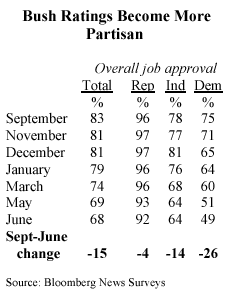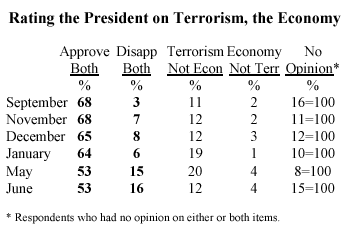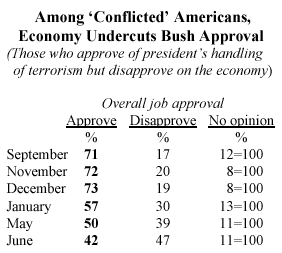The war on terrorism continues to be the pillar supporting President Bush’s extraordinary approval ratings. But there are indications its strength is diminishing, as disapproval of Bush’s handling of the economy has come to play a larger role in his overall job performance ratings.

The president’s ratings remain high by historical standards, though they have softened since the fall. According to regularly conducted Bloomberg News surveys, 68% approved of the way the president was handling his job in June, down from more than 80% during the last quarter of 2001. Other major national polls, including those conducted by the Pew Research Center, show a similar trend.
Much of the falloff has occurred among Democrats and independents. As recently as December, nearly two-thirds of Democrats (65%) approved of Bush’s overall job performance in the Bloomberg survey. By June, that number had declined to 49%. Among independents, the erosion also has been pronounced (81% to 64%), while Republican support remains nearly unanimous.
This decline is linked to changes in opinion of the president’s performance on the public’s two leading issues — terrorism and the economy. In June, seven-in-ten approved of the job the president is doing on terrorism, down from a peak of 89% in September. Six-in-ten gave him high marks on the economy, down from 71% in September.
As a result, while a majority of Americans still give Bush favorable marks on both terrorism and the economy, their numbers are decreasing. As recently as December, nearly two-thirds of Americans (65%) gave him high marks on both issues; that number fell to 53% by May. Not surprisingly, virtually all of those who back the president on these issues approve of the president’s overall performance.

Over the same period, a small but growing minority — nearly all of whom are independents and Democrats — disapprove of Bush’s handling of the war on terrorism and his performance on the economy. That number has doubled since December (from 8% to 16%). As expected, the vast majority of this group disapproves of his overall job performance.
But there is another group, whose views have shifted over time, which may pose more trouble for the White House. Since last fall, anywhere from 11% to 20% of Americans have held conflicting views of the president — they like the job he has done on terrorism, but not the economy. While not increasing in size, this group is becoming far less supportive of the president — 42% approved of Bush’s overall job performance in June, compared with 73% who did so in December.

Those who have conflicting views of the president tend to be Democrats and independents. Still, this was a group that approved of the president by nearly four-to-one seven months ago and is now divided, even though they continue to endorse his performance on terrorism.
Among this group, the economy has evidently begun to take priority and this has negatively affected their overall view of the president. Barring unforeseen events, the president’s future job approval ratings may depend on his ability to stem further defections among these economic doubters, and perhaps more important, to keep their number to a minimum.

